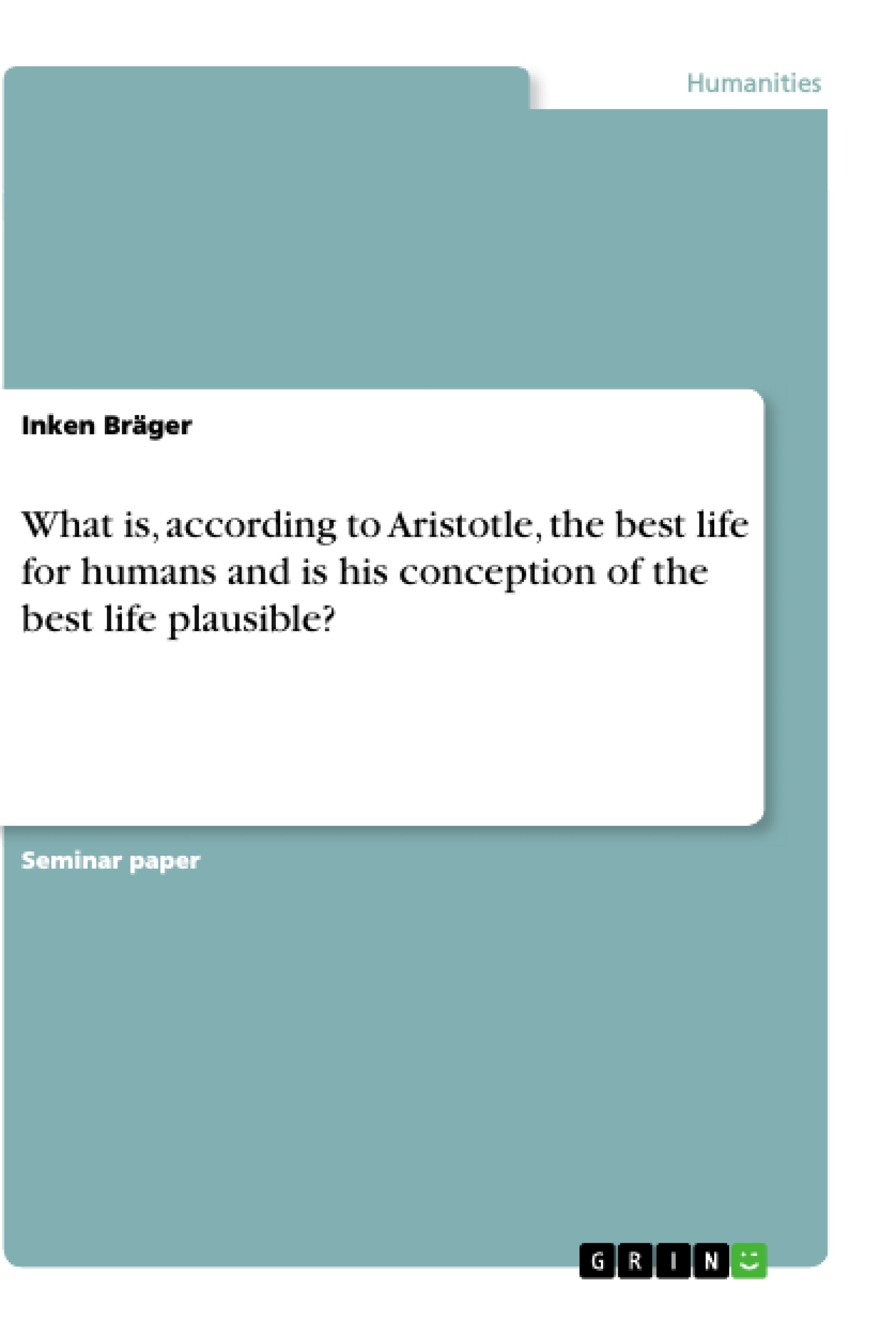Aristotle expresses it directly with the first sentence of his first book of his Nicomachean Ethics: All we’re aiming for is the good life as the highest good. For him, the good life is the reason we live. For this, the pursuit of happiness, called Eudaimonia, is central to his theory. Throughout history, many people have grappled with the question of what makes a good and fortunate life, and even today this topic is very present and controversial.
In the following, I’m dealing with Aristotle concerning the best life, to prove that his principle of Eudaimonia is a convincing theory. It’s to be examined, that his conception of a good life is the objectively desirable one. After the central assumption I’ll outline the main features of Virtue Ethics before questioning the plausibility of the Aristotelian theory. I will do that by relating to two objections: how it should be judged that material goods are a precondition to Aristotle’s best life and how pleasurable the life of a virtuous is. Even though there are more objections, like different interpretations of Eudaimonia or different interpretations of the right measure according to virtue for example, I’d like to retain with the previous two, as they are the most interesting regarding the 21st century. At last I will give a summary to conclude the elaboration.
Table of Contents
- Introduction
- Aristotle's best life for humans
- Objection I
- Objection II
- Conclusion
Objectives and Key Themes
This paper aims to evaluate Aristotle's conception of the best life for humans, specifically his concept of Eudaimonia, and assess its plausibility in the 21st century. It examines whether Aristotle's view of a good life is objectively desirable.
- Aristotle's concept of Eudaimonia as the ultimate human goal.
- The role of virtue ethics in achieving Eudaimonia.
- The necessity of external goods for a flourishing life.
- The relationship between pleasure and virtue.
- The plausibility of Aristotle's theory in contemporary society.
Chapter Summaries
Introduction: This introductory chapter sets the stage by establishing Aristotle's assertion that the ultimate human goal is the good life, or Eudaimonia. It outlines the paper's objective: to examine the persuasiveness of Aristotle's theory and its relevance to modern life. The chapter also previews the structure, focusing on the core features of Virtue Ethics and addressing two key objections regarding material goods and the nature of a virtuous life.
Aristotle's best life for humans: This chapter delves into Aristotle's definition of Eudaimonia, emphasizing that the pursuit of happiness is an active process, not merely the attainment of a goal. Aristotle categorizes various life forms (bioi), rejecting those driven by external factors (pleasure, wealth, honor) in favor of lives focused on moral-political and scientific-philosophical virtues. A happy life, according to Aristotle, is self-sufficient and intrinsically rewarding, emphasizing virtuous activity itself rather than external rewards.
Objection I: This section addresses the criticism that Aristotle's Eudaimonia requires external goods like wealth and social standing, potentially making it unattainable for many. The chapter introduces the concept of marginal utility to counter this argument, suggesting that while basic financial security might be necessary, excessive accumulation of wealth doesn't necessarily lead to increased happiness. The chapter concludes by questioning whether all of Aristotle's listed external goods are truly necessary for achieving Eudaimonia.
Keywords
Eudaimonia, Virtue Ethics, Aristotle, Happiness, External Goods, Marginal Utility, Moral Virtues, Pleasure, Objectively Desirable Life.
Frequently Asked Questions: Aristotle's Conception of the Best Life for Humans
What is the main topic of this paper?
This paper critically examines Aristotle's concept of Eudaimonia (flourishing) as the ultimate human goal and assesses its relevance and plausibility in the 21st century. It investigates whether Aristotle's vision of a good life is objectively desirable.
What are the key themes explored in the paper?
The paper explores Aristotle's concept of Eudaimonia, the role of virtue ethics in achieving it, the necessity of external goods, the relationship between pleasure and virtue, and the applicability of Aristotle's theory to contemporary society.
What is Aristotle's concept of Eudaimonia?
According to Aristotle, Eudaimonia is not merely the attainment of a goal but an active process of living virtuously. He rejects life pursuits driven by external factors like pleasure, wealth, or honor, advocating for lives focused on moral-political and scientific-philosophical virtues. A truly happy life is self-sufficient and intrinsically rewarding, emphasizing virtuous activity itself.
What objections to Aristotle's theory are addressed?
The paper addresses the criticism that Aristotle's Eudaimonia requires external goods like wealth and social standing, potentially making it inaccessible to many. It also implicitly addresses the potential difficulty in living a consistently virtuous life.
How does the paper respond to the objection about external goods?
The paper uses the concept of marginal utility to argue that while basic financial security might be necessary, excessive wealth doesn't necessarily increase happiness. It questions whether all the external goods Aristotle listed are truly essential for achieving Eudaimonia.
What is the structure of the paper?
The paper is structured with an introduction outlining the objective and methodology, a chapter detailing Aristotle's view of Eudaimonia, a section addressing objections to the theory, and a conclusion. The structure focuses on the core features of Virtue Ethics.
What are the key words associated with this paper?
Eudaimonia, Virtue Ethics, Aristotle, Happiness, External Goods, Marginal Utility, Moral Virtues, Pleasure, Objectively Desirable Life.
What is the overall conclusion (implied)?
While not explicitly stated as a single conclusive statement, the paper aims to provide a thorough analysis of Aristotle's theory, weighing its strengths and weaknesses in the context of modern life. The implied conclusion would likely assess the enduring relevance and limitations of Aristotle’s ideas on happiness in a contemporary setting.
- Quote paper
- Inken Bräger (Author), 2020, What is, according to Aristotle, the best life for humans and is his conception of the best life plausible?, Munich, GRIN Verlag, https://www.grin.com/document/535378




